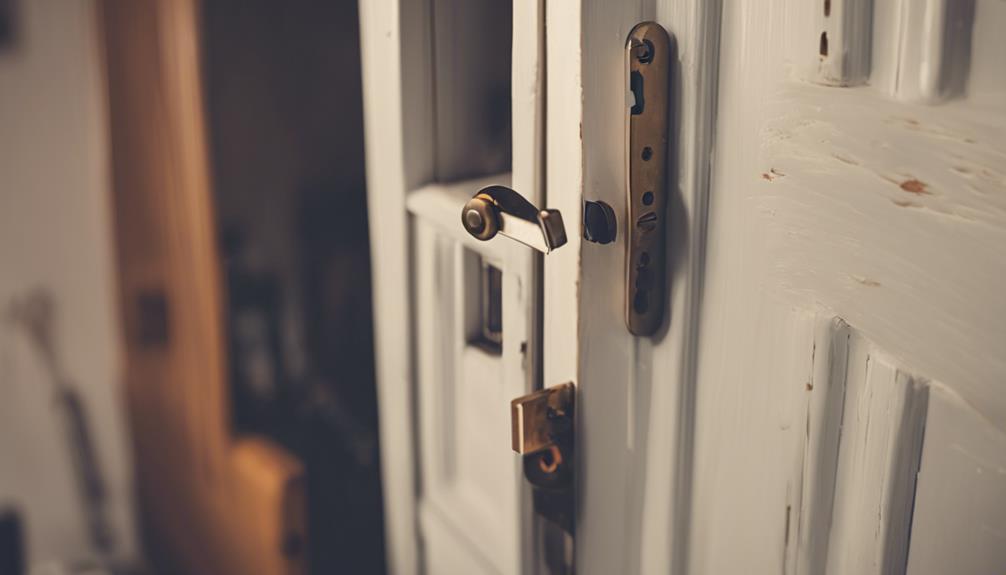Poor installation can quickly void your lock warranty, leaving you vulnerable to security issues. If you misalign the lock with the strike plate or fail to use the right tools, you risk damaging the lock. These mistakes may be seen as improper usage, which manufacturers often cite to deny warranty claims. Even ignoring installation instructions can lead to significant errors. To safeguard your investment, it's wise to have a professional handle the installation, as they follow best practices and guarantee compliance. Want to know more about protecting your warranty? You'll want to explore the specifics further.
Key Takeaways
- Improper alignment with the strike plate can be deemed improper usage, leading to warranty voiding.
- Using incorrect tools can cause damage, resulting in user error and voided warranty claims.
- Failure to follow installation instructions can create significant errors that might void warranty coverage.
- Lack of professional installation documentation can lead to denied warranty claims for damages.
- Neglecting to test the lock post-installation may expose vulnerabilities, risking warranty coverage.
Common Installation Mistakes
When installing a lock, it's easy to overlook the details that can lead to serious problems down the line. Many people unknowingly make common installation mistakes that can compromise security and customer satisfaction.
For instance, failing to align the lock properly with the strike plate can cause the lock to jam or become ineffective. To avoid this, consider mastering lock cylinder replacement to guarantee proper installation techniques. You'll also want to verify you're using the right tools; using improper tools can strip screws or damage the lock itself.
Another frequent blunder is neglecting to read the installation instructions carefully. Skipping steps or misinterpreting guidelines can lead to installation errors that may seem minor but can have significant repercussions.
Additionally, not testing the lock after installation is a mistake that can leave you and your clients vulnerable.
Lastly, consider the importance of confirming the door itself is in good condition. A warped or damaged door can prevent even the best lock from functioning correctly.
Impact on Warranty Coverage
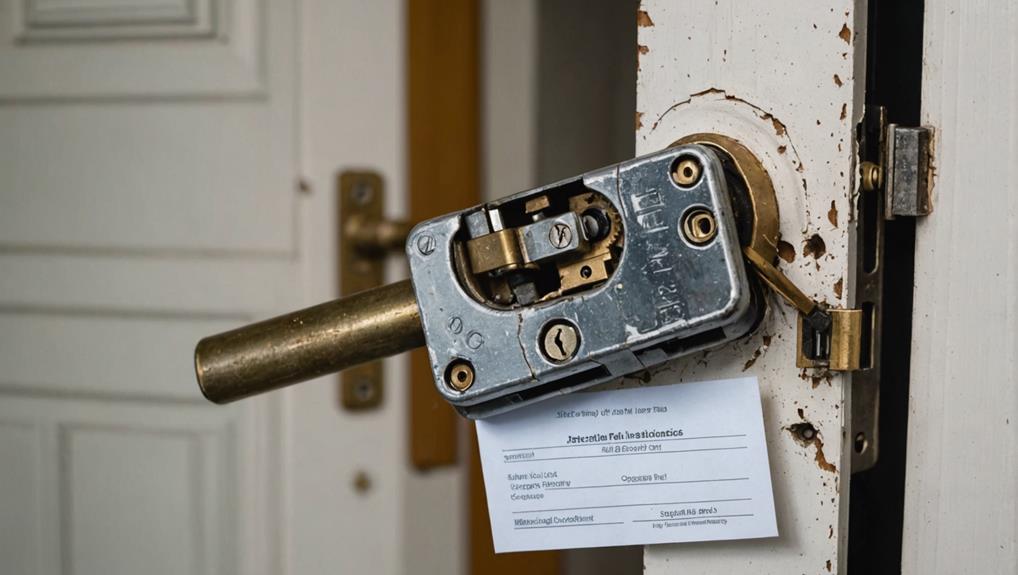
Poor installation practices not only compromise security but can also lead to warranty issues. When you cut corners or overlook essential steps, you might end up with a voided lock warranty, leaving you and your clients vulnerable.
Opting for cheap locksmith services can exacerbate these risks, as they often lack the expertise and quality assurance needed for proper installations the hidden dangers of cheap services.
Here are three key ways poor installation can affect warranty coverage:
- Misalignment: If the lock isn't installed correctly, it may not function as intended, which can be flagged as improper usage.
- Improper Tools: Using the wrong tools can damage the lock or its components, leading to claims that the warranty is voided due to user error.
- Lack of Documentation: Failing to provide proper installation documentation or proof of professional installation can result in denied warranty claims.
Understanding these impacts is essential. A voided lock warranty not only affects your clients but also reflects on your reputation as a reliable service provider.
Importance of Professional Installation
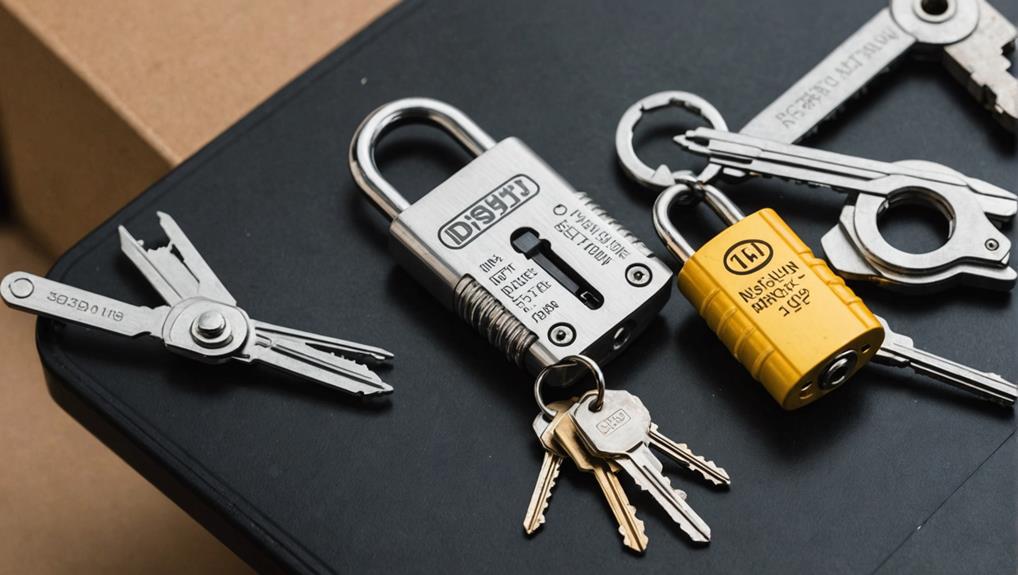
Professional installation is essential for ensuring the longevity and effectiveness of your locks. When you choose to have your locks installed by a professional, you're not just investing in their expertise; you're also safeguarding your property and the people you serve.
Skilled technicians understand the nuances of various lock types and the specific requirements for each, reducing the likelihood of lock installation mistakes. Additionally, hiring professionals often involves a breakdown of costs that reflects the quality of service provided, which can ultimately save you from future expenses related to security breaches or repairs the costs of hiring professionals.
Consider how a small error during installation could lead to significant security issues down the line. Misaligned locks or improperly fitted components can leave your property vulnerable, and that's the last thing you want for those you care about.
Professionals are trained to spot potential pitfalls and address them before they become a problem.
Moreover, professional installation often comes with a warranty, which provides you peace of mind. If anything goes wrong, you can count on their support rather than worrying about the repercussions of DIY mistakes.
Steps for Warranty-Compliant Installation
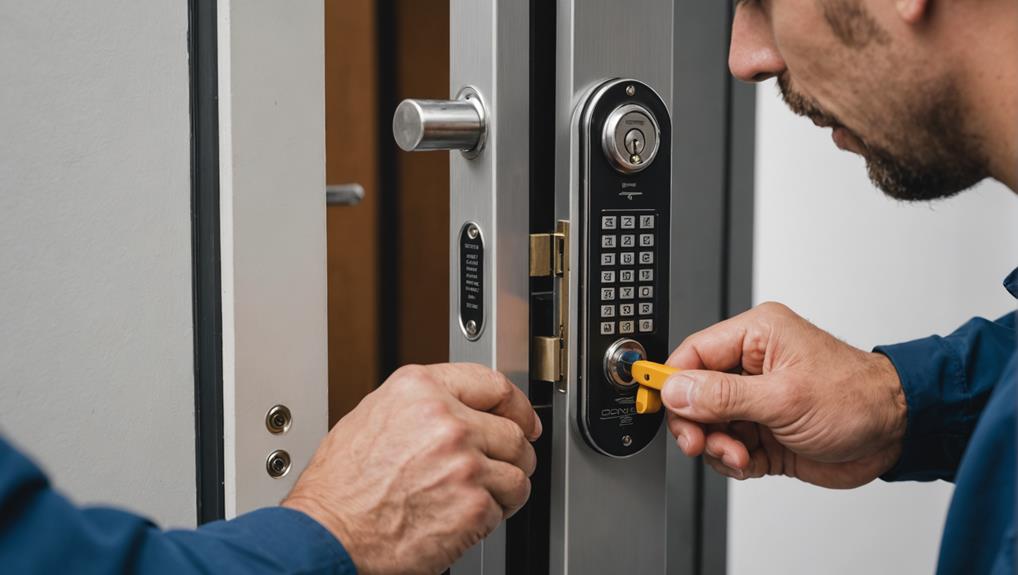
Guaranteeing your lock installation complies with warranty requirements is vital to maintaining its validity and protecting your investment.
Using the correct tools is essential not only for the installation process but also for avoiding potential damage to the lock, which can risks of using the wrong ones that may void your warranty.
By following these key steps, you can learn how to install locks properly and keep your warranty intact:
- Read the Instructions: Always start by carefully reviewing the manufacturer's installation manual. Each lock may have specific requirements that guarantee proper function and warranty compliance.
- Use the Right Tools: Gather all necessary tools before you begin. Having the right equipment, like a drill and screwdriver, is essential. Using improper tools can lead to damage that voids your warranty.
- Follow Installation Guidelines: Stick to the recommended installation procedures, including proper alignment and securing of the lock. Deviating from these guidelines could compromise the lock's integrity and your warranty.
Verifying Warranty Terms
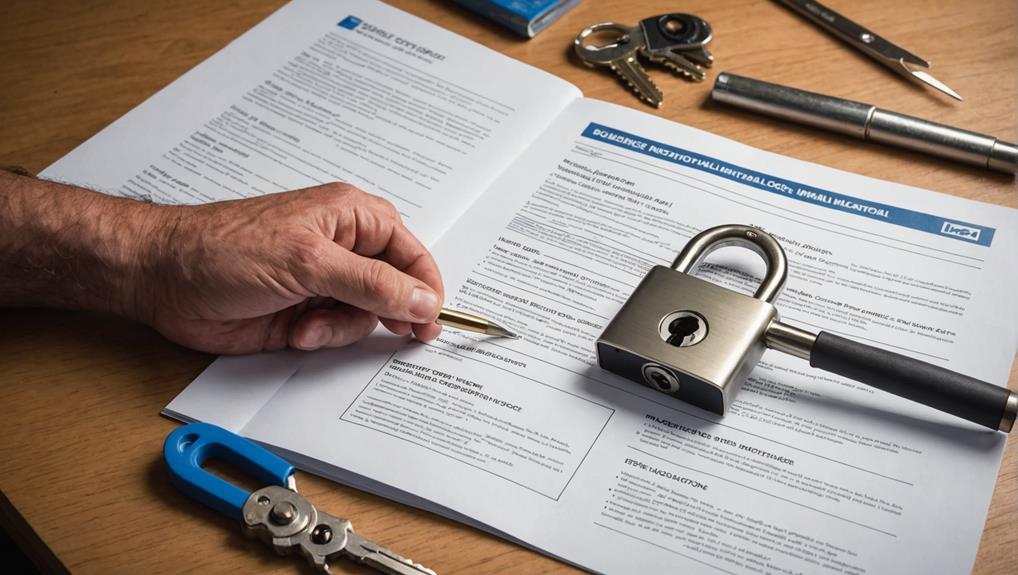
When it comes to lock warranties, understanding the specific terms can save you from unwanted surprises down the line. Start by reading the warranty documents carefully; they often outline what's covered and what isn't.
Look for details about lock warranty protection, such as the duration of coverage and the conditions that could void it. It's important for businesses to take into account the significance of essential lock replacement to maintain security and guarantee warranty compliance.
It's critical to clarify what constitutes proper installation. Many warranties specify that only certified professionals can install the locks to maintain warranty validity. If you or someone else installs the lock incorrectly, you might risk losing your warranty entirely.
Don't hesitate to reach out to the manufacturer or retailer for clarification. They're there to help you understand the fine print; asking questions can prevent future headaches.
Additionally, keep all documentation related to the purchase and installation. This proof can be essential if you ever need to file a claim.
Frequently Asked Questions
Can I Install Locks Myself Without Voiding the Warranty?
Yes, you can install locks yourself without voiding the warranty, but it's crucial to follow the manufacturer's guidelines closely.
Make sure you read the instructions thoroughly and use the right tools. If you're unsure, consider watching tutorial videos or seeking help from a professional.
Proper installation not only guarantees the lock works effectively but also keeps your warranty intact, giving you peace of mind while serving others with your newfound skills.
What Specific Tools Are Needed for Proper Lock Installation?
To install locks properly, you'll need a few essential tools.
Grab a screwdriver, usually a Phillips head, for securing screws. A tape measure guarantees accurate placement, while a chisel helps create a snug fit for the lock.
Don't forget a drill with the right bits for making holes. A level will keep everything straight.
With these tools in hand, you're set to install your locks securely and effectively!
How Can I Find a Qualified Locksmith in My Area?
Did you know that nearly 30% of people hire unqualified locksmiths, leading to security risks?
To find a qualified locksmith in your area, start by asking friends or family for recommendations. You can also check online reviews and local directories.
Make sure they're licensed and insured. Contact them, ask about their experience, and get quotes.
Trustworthy professionals are dedicated to serving your needs and ensuring your peace of mind.
Are There Any Brands With More Lenient Warranty Policies?
When you're looking for brands with more lenient warranty policies, consider well-known names like Kwikset and Schlage.
They often offer extended warranties or more flexible terms.
It's a good idea to read customer reviews and compare policies, as some brands may provide better coverage for specific issues.
Don't hesitate to reach out to manufacturers directly; they can clarify any questions and help you feel confident in your purchase.
What Should I Do if My Lock Fails During the Warranty Period?
Oh, the irony! You buy a lock, believing it'll stand the test of time, only to find it's like a diva that demands attention.
If your lock fails during the warranty period, first, check the warranty details. Gather your proof of purchase and document the issue.
Then, contact the manufacturer's customer service. They might just send you a replacement, but remember, a little politeness goes a long way in these situations!
Conclusion
In a world where even the mightiest fortress can fall due to a single weak link, don't let poor installation jeopardize your lock warranty. By ensuring you follow proper installation methods and understanding your warranty terms, you protect your investment against unforeseen failures. Remember, a solid lock deserves a solid installation. So, whether you're a DIY enthusiast or prefer calling in the pros, take the time to get it right—your peace of mind is worth it.

